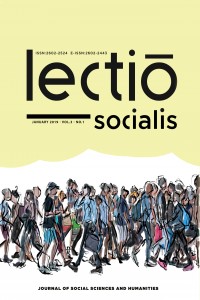Abstract
The Turks living in the Dobruca region of Romania took part in the press with the Turkish newspapers published in the late 19th century. One of the newspapers published here was published under the name of Romania and was given.information about the Turks living in the region. Among the topics in the newspaper Romania, draws attention approaches related to the adoption of the Latin alphabet in Turkey. The adoption of the Latin alphabet in Turkey, Turks living in Dobruca assessments are available on how to impress. In the news published in the Romanian newspaper, it is emphasized that the Turks of Dobruca should use Latin alphabet. In this article, in Turkey, the admissions process of the Latin alphabet and reflections on the subject in the Romanian newspaper will be evaluated.
References
- T.C. Cumhurbaşkanlığı Devlet Arşivleri, Fon Kodu: 30-18-1-1, Yer No: Kutu: 29, Gömlek: 32, Sıra: 20, 23. 5. 1928.
- Romanya, 15 Teşrin-i Evvel 1928, Sayı 518.
- Romanya, 7 Kanun-i Evvel 1929, Sayı 549.
- “Latin Hurufatı”, Romanya, 13 Ağustos 1928, Sayı 509.
- “Latin Harfleri Münasebetiyle”, Romanya, 23 Temmuz 1928, Sayı 507.
- “Yeni Türk Harfleri Hakkında”, Romanya, 25 Teşrin-i Sani 1929, Sayı 547.
- FAZIL, Müstecib H., “Yeni Türk Harflerini Kabul Etmeliyiz”, Romanya, 20 Ağustos 1928, Sayı 510.
- ISMAİL, Nilghiun, (2015), “Kırım - Romanya Kırım Tatar Topluluğu”, Yeni Türkiye, 81, ss.487-493.
- KARPAT, Kemal, (1994),“ Dobruca”, İslam Ansiklopedisi, C.9, ss.482-486.
- ÖNAL, Mehmet Naci, (1994), “Romanya Türklerine Bakış”, Türk Dünyası Araştırmaları, S.93, S. 93, Aralık, ss.177-190.
- ÜLKÜSAL, Müstecib, (1987), Dobruca ve Türkler, Ankara, TKAE Yayınları.
Abstract
Romanya’nın Dobruca bölgesinde yaşayan Türkler, XIX. yy sonlarında çıkardıkları Türkçe gazetelerle basın hayatında yer almışlardır. Burada yayımlanan gazetelerden biri de Romanya ismi ile çıkarılmış olup, bölgede yaşayan Türklere dair bilgilere yer verilmiştir. Romanya Gazetesi’nde yer alan konular arasında, Türkiye’de Latin harflerinin kabulü ile ilgili yaklaşımlar dikkat çekmektedir. Türkiye’de Latin harflerinin kabulünün, Dobruca’da yaşayan Türkleri nasıl etkileyeceğine dair değerlendirmeler mevcuttur. Romanya Gazetesi’nde yer verilen haberlerde Latin harflerini Dobruca Türklerinin de kullanması gereği üzerinde durulmaktadır. Bu makalede Türkiye’de Latin harflerinin kabul süreci ve konu ile ilgili olarak Romanya Gazetesi’ne yansımaları değerlendirilecektir.
References
- T.C. Cumhurbaşkanlığı Devlet Arşivleri, Fon Kodu: 30-18-1-1, Yer No: Kutu: 29, Gömlek: 32, Sıra: 20, 23. 5. 1928.
- Romanya, 15 Teşrin-i Evvel 1928, Sayı 518.
- Romanya, 7 Kanun-i Evvel 1929, Sayı 549.
- “Latin Hurufatı”, Romanya, 13 Ağustos 1928, Sayı 509.
- “Latin Harfleri Münasebetiyle”, Romanya, 23 Temmuz 1928, Sayı 507.
- “Yeni Türk Harfleri Hakkında”, Romanya, 25 Teşrin-i Sani 1929, Sayı 547.
- FAZIL, Müstecib H., “Yeni Türk Harflerini Kabul Etmeliyiz”, Romanya, 20 Ağustos 1928, Sayı 510.
- ISMAİL, Nilghiun, (2015), “Kırım - Romanya Kırım Tatar Topluluğu”, Yeni Türkiye, 81, ss.487-493.
- KARPAT, Kemal, (1994),“ Dobruca”, İslam Ansiklopedisi, C.9, ss.482-486.
- ÖNAL, Mehmet Naci, (1994), “Romanya Türklerine Bakış”, Türk Dünyası Araştırmaları, S.93, S. 93, Aralık, ss.177-190.
- ÜLKÜSAL, Müstecib, (1987), Dobruca ve Türkler, Ankara, TKAE Yayınları.
Details
| Primary Language | Turkish |
|---|---|
| Journal Section | Research Articles |
| Authors | |
| Publication Date | January 30, 2019 |
| Submission Date | January 22, 2019 |
| Acceptance Date | January 29, 2019 |
| Published in Issue | Year 2019 Volume: 3 Issue: 1 |
Lectio Socialis is a prestigious, international, and peer-reviewed journal that aims to provide a platform for scholars and researchers to share their work and ideas on policy-relevant topics related to social sciences. The journal welcomes high-quality articles from a wide range of disciplines, including economics, political science, public administration, business administration, international relations, urban planning, sociology, psychology, history, jurisprudence, and philosophy. The primary objective of Lectio Socialis is to maintain a vibrant, independent, and unbiased environment for scholars and researchers from different parts of the world to present their research, exchange ideas, and contribute to the advancement of knowledge in their respective fields.



